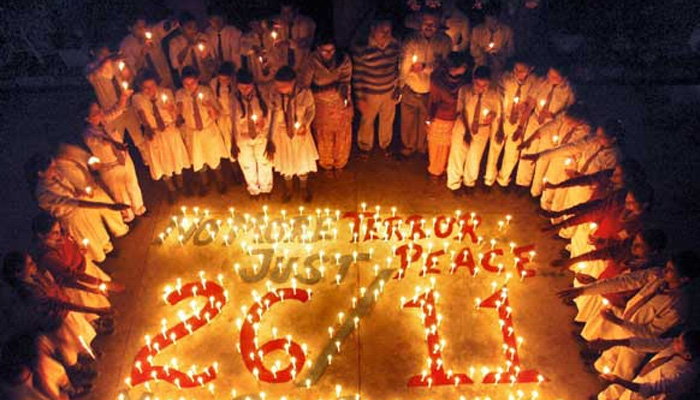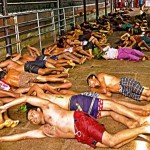Mumbai: On the sixth anniversary of 2008 Mumbai terror attacks, Prime Minister Narendra Modi on Wednesday paid homage to the innocent people who lost their lives.
PM Modi who is in Nepal to attend the South Asian Association for Regional Cooperation (SAARC) Summit took to his micro blogging site to remember the martyrs of 26/11 attacks.
66 people lost their lives in the dastardly terror attacks. India terms Jamaat-ud-Dawa (JuD) chief Hafiz Saeed as an “evil mastermind” of the Mumbai terror attack, which Pakistan vehemently denies. India has since long been demanding the deportation of Saeed from Pakistan so that he can be tried for his involvement in the Mumbai attacks. However, Pakistan has refused to do so stating that there are no credible evidence relating his involvement in the attack. The US has placed JuD, which is a frontal organization for terror group Laskar-e-Toiba (LeT), on the banned foreign terrorist organisation list. Lashkar-e-Toiba operations commander Zakiur Rehman Lakhvi, Abdul Wajid, Mazhar Iqbal, Hamad Amin Sadiq, Shahid Jameel Riaz, Jamil Ahmed and Anjum have been charged with planning, financing and executing the attacks in India’s financial capital that killed 166 people in November, 2008.
…………………………………….
Narendra Modi to address SAARC summit, raise 26/11 attacks in Nawaz Sharif’s presence
Kathmandu: While addressing the South Asian Association for Regional Cooperation (SAARC) Summit on Wednesday, Prime Minister Narendra Modi is likely to raise the 26/11 Mumbai attacks in presence of Pakistan Premier Nawaz Sharif.
It would be interesting to hear Sharif’s response if Modi raises the contentious issue on the sixth anniversary of 26/11 attacks. For long, Pakistan’s response to the dastardly attacks has been the same. They have been repeatedly maintaining that they are the biggest victims of terrorism.
During a meet of council of ministers of SAARC nations in Kathmandu today, India strongly raised the issue of terrorism, thus raising speculations of PM Modi raking up the 26/11 attacks during his address to the SAARC nations.
India terms Jamaat-ud-Dawa (JuD) chief Hafiz Saeed as an “evil mastermind” of the Mumbai terror attack, which Pakistan vehemently denies.
India has since long been demanding the deportation of Saeed from Pakistan so that he can be tried for his involvement in the Mumbai attacks. However, Pakistan has refused to do so stating that there are no credible evidence relating his involvement in the attack.
The US has placed JuD, which is a frontal organization for terror group Laskar-e-Toiba (LeT), on the banned foreign terrorist organisation list.
Lashkar-e-Toiba operations commander Zakiur Rehman Lakhvi, Abdul Wajid, Mazhar Iqbal, Hamad Amin Sadiq, Shahid Jameel Riaz, Jamil Ahmed and Anjum have been charged with planning, financing and executing the attacks in India’s financial capital that killed 166 people in November, 2008.
Besides the 2008 Mumbai attacks that killed 166 people, PM Modi is also expected to raise the issue of infiltration and repeated ceasefire violations along the Line of Control from the Pakistani side.
During his address, PM Modi is likely to seek the cooperation of India’s neighbours to check extremist violence and to adopt an approach of zero tolerance towards terrorism at the two-day SAARC Summit.
The Prime Minister is expected to articulate strongly the issue of terrorism which affected most of the South Asian countries and stress the need of tackling the menace jointly, official sources said today.
Modi will highlight before the heads of SAARC nations that India, being one of the worst victims of terrorism, has been taking an approach of zero tolerance towards the problem and all countries must adopt a similar approach, sources said.
The two-day SAARC Summit is expected to deliberate on a range of issues including liberalising trade, enhancing cooperation in the fields of education, health care, ensuring energy security and to deal with challenges of climate change.
Since becoming Prime Minister, Modi has been stressing on strengthening SAARC and he is likely to lay out his vision for regional cooperation in South Asia and India’s approach to harnessing the developmental potential of the region.
The South Asian Association for Regional Cooperation (SAARC) comprises Bangladesh, Bhutan, India, the Maldives, Nepal, Pakistan, Sri Lanka and Afghanistan.



